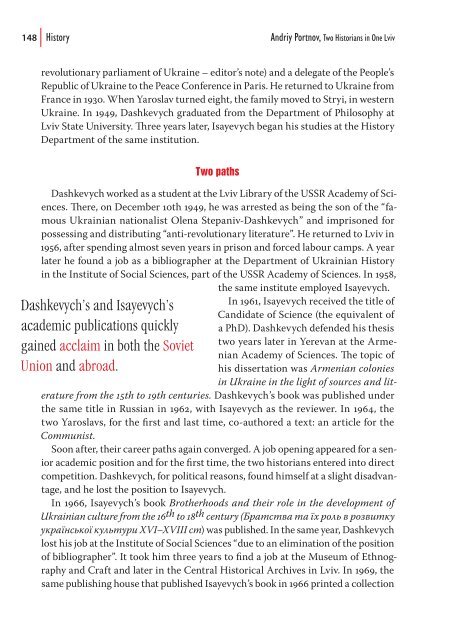Create successful ePaper yourself
Turn your PDF publications into a flip-book with our unique Google optimized e-Paper software.
148<br />
History Andriy Portnov, Two Historians in One Lviv<br />
revolutionary parliament of Ukraine – editor’s note) and a delegate of the People’s<br />
Republic of Ukraine to the Peace Conference in Paris. He returned to Ukraine from<br />
France in 1930. When Yaroslav turned eight, the family moved to Stryi, in western<br />
Ukraine. In 1949, Dashkevych graduated from the Department of Philosophy at<br />
Lviv State University. Th ree years later, Isayevych began his studies at the History<br />
Department of the same institution.<br />
Two paths<br />
Dashkevych worked as a student at the Lviv Library of the USSR Academy of Sciences.<br />
Th ere, on December 10th 1949, he was arrested as being the son of the “famous<br />
Ukrainian nationalist Olena Stepaniv-Dashkevych” and imprisoned for<br />
possessing and distributing “anti-revolutionary literature”. He returned to Lviv in<br />
1956, after spending almost seven years in prison and forced labour camps. A year<br />
later he found a job as a bibliographer at the Department of Ukrainian History<br />
in the Institute of Social Sciences, part of the USSR Academy of Sciences. In 1958,<br />
the same institute employed Isayevych.<br />
Dashkevych’s and Isayevych’s<br />
academic publications quickly<br />
gained acclaim in both the Soviet<br />
Union and abroad.<br />
In 1961, Isayevych received the title of<br />
Candidate of Science (the equivalent of<br />
a PhD). Dashkevych defended his thesis<br />
two years later in Yerevan at the Armenian<br />
Academy of Sciences. Th e topic of<br />
his dissertation was Armenian colonies<br />
in Ukraine in the light of sources and literature<br />
from the 15th to 19th centuries. Dashkevych’s book was published under<br />
the same title in Russian in 1962, with Isayevych as the reviewer. In 1964, the<br />
two Yaroslavs, for the fi rst and last time, co-authored a text: an article for the<br />
Communist.<br />
Soon after, their career paths again converged. A job opening appeared for a senior<br />
academic position and for the fi rst time, the two historians entered into direct<br />
competition. Dashkevych, for political reasons, found himself at a slight disadvantage,<br />
and he lost the position to Isayevych.<br />
In 1966, Isayevych’s book Brotherhoods and their role in the development of<br />
Ukrainian culture from the 16 th to 18 th century (Братства та їх роль в розвитку<br />
української культури XVI–XVIII ст) was published. In the same year, Dashkevych<br />
lost his job at the Institute of Social Sciences “due to an elimination of the position<br />
of bibliographer”. It took him three years to fi nd a job at the Museum of Ethnography<br />
and Craft and later in the Central Historical Archives in Lviv. In 1969, the<br />
same publishing house that published Isayevych’s book in 1966 printed a collection



